- Home
- Evelyn James
The Cowboy's Crime Page 3
The Cowboy's Crime Read online
Page 3
Both Clara and the funfair owner looked surprised.
“Why would I pay her?” The owner complained.
“Because Clara is Brighton’s foremost private detective and what happened here tonight is extremely sinister. Someone wanted to unhinge your best performer and they have done a good job of it. Now the reason for that we don’t know, but you have to agree it implies someone with a deep hatred for him, and a possible desire to do worse than just slay his horse.”
Clara filled with warmth to hear O’Harris promoting her. She had been aiming to keep on the periphery of this affair, since she had other things on her plate, but she could not help admitting that something unpleasant was afoot and she did not like ignoring it.
O’Harris stood firm and awaited the fair owner’s reply. The man’s face drifted from outrage to astonishment as he listened to the captain’s proposal. He glanced at Clara and seemed even more bemused, then he remembered himself.
“Fine, I can live with that. If you don’t want my money, I shall pay her,” he flicked a thumb at Clara which felt rather dismissive.
Clara was annoyed, but she let it go. Everyone was tense and not necessarily responding to things as well as they should. O’Harris narrowed his eyes.
“Good.”
“I’ll need the cooperation of all your employees,” Clara told the owner. “And it would help if I knew your name.”
“Llewellyn Maven,” the man told her. “I’ll tell my people to help you, but I don’t see how this will work.”
“Someone has harmed your gunslinger,” Clara reminded Maven. “That has to be cause for concern. Could this be a warning? Might worse follow?”
“You mean someone might kill him?” Maven’s eyes widened in horror and he had to put a handout to the side of the caravan to steady himself. “Do you know how that would destroy us?”
“Could that be the reason behind this?” Clara observed. “Nothing personal towards Clark, but an attempt to ruin you.”
Clara did not entirely believe that, she felt the attack had been focused and deliberately designed to cause Clark the maximum hurt, but she allowed Mr Maven to think his livelihood was under attack if that was what it took to get him to appreciate the seriousness of the situation. Clara was more concerned that Clark could be in trouble, that someone was out to harm him and this was just the start. She wanted to help, because Clara could not simply walk away from a problem, not once she had become involved. If she left the fair, turned her back, forgot about what she had seen and then Clark was seriously hurt or killed, she would never forgive herself.
Her words had struck Maven where they stung the most – in his wallet – and he stood for a moment imagining all the hideous outcomes to him if Clark was lost to the fair. The future he imagined was apparently vivid and unhappy, for his face turned into a grimace of horror.
“All right, you have to figure out this disaster,” he said at last. “And I need Clark back, soon.”
He glanced between the pair of them.
“There are always tensions in a place like this with so many people, but it’s rare for those grievances and arguments to boil over into something serious. I need to know what might be happening here, I need to know what trouble I could be in.”
Llewellyn Maven launched himself down the steps of the caravan and headed out into his funfair. He did not give them a backward glance and seemed certain they would do everything he had demanded.
“A man used to getting his own way,” O’Harris remarked once he was out of earshot.
“If I didn’t think this could be a prelude to a murder, I wouldn’t be offering my help at all,” Clara added.
“You think this is the start of something really nasty?” O’Harris’ irritation turned to alarm in an instant.
“I think that is very possible. But let’s see if we can get any information from Clark first before I make a decision.”
They headed into the caravan where Clark was still huddled up on the bench asleep. Clara lifted a woollen blanket from a shelf and laid it over him, he twitched a little in his slumber, but did not stir.
“That’s Gung-Ho,” O’Harris was pointing to a picture on the wall.
Clara looked at the black and white photograph of a piebald horse. The handsome animal was wearing full saddle and bridle and was stood in what appeared to be a desert landscape, with a cactus just to its left. The picture was framed and a plate on the bottom gave the horse’s name.
“Poor creature,” Clara said sadly, feeling grim at the thought of the dead horse on the beach. “Who would do such a thing?”
“Someone awful,” O’Harris said with equal bitterness.
They had both unconsciously dropped their voices, so as not to disturb the sleeping cowboy. While they waited for him to wake, they spent some time exploring the tiny caravan and looking for any clues as to why someone had taken such a grudge against him.
There were certainly plenty of photographs screwed to the walls to look at. While several were of horses similar to Gung-Ho, there were also numerous shots of people and even a few scenes. As far as Clara could tell, none had been taken after Clark had left America. These past few years in England had not warranted a picture. Clara wondered if that was significant.
O’Harris had picked up another revolver; Clark seemed to have quite a collection. He was studying it in his hands. A gruff voice from the bench caught him unawares:
“Put that down cowpolk and I won’t get angry.”
Clara turned from her observation of a picture of what might have been a Mexican taverna to see Clark sitting up slowly. He groaned a little and rubbed at his eyes, the blanket slumping from his shoulders. O’Harris obediently put down the gun.
“Nice to see you awake,” Clara told the cowboy. “I don’t know if you remember, but my friend and I came to your assistance a short time ago. We were just checking up on you.”
With bleary eyes Clark looked at Clara.
“Can’t say I do remember, miss, and I surely would recall such a pretty face as yours.”
Clara felt a little flushed at the compliment and cleared her throat. Out of the corner of her eye, she saw O’Harris looking a touch disgruntled.
“How are you feeling, Mr…? Actually, I don’t know your full name.”
“Clark Wolfman,” the cowboy told her, holding out his hand for her to shake. Clara was touched by the gesture, since many men were still reluctant to shake a woman’s hand. “But you can call me Clark, everyone does.”
“Clark,” Clara said, deciding to go with informal. “Do you recall what happened tonight?”
Clark had been smiling, but slowly the smile faded from his face and was replaced by an expression of troubled confusion. He glanced around the caravan anxiously.
“Where am I?”
“Your home,” Clara said, pointing to the pictures on the wall. “Does it not look familiar?”
Clark squinted up his eyes and took a good look around himself.
“Bits do,” he agreed. “I recognise that gun your friend was holding. Picked that up in Nebraska, little two-bit town with a sheriff more drunk than the townsfolks.”
“What doesn’t feel familiar?” O’Harris asked him, moving to stand beside Clara so he could better see Clark.
The cowboy looked around him again.
“This… this place,” he waved his hands up in the air and around him to indicate the caravan. “You say this is my home, but I don’t recognise any part of it. No, that’s not what I mean, I recognise my belongings, my things, but I don’t recognise the structure. Since when did I live in a caravan? I have a cosy log cabin in California, not far from where they do all those movie films. I’ve been hired once or twice to feature in the Westerns, but I don’t like it much. It’s all the repetitions. But I have never lived in a caravan, never.”
Clark glared at the walls of his home, the walls that looked so strange and unlike any place he could recall. He clenched his hands and a hint of anger crept into h
is voice.
“This makes no sense, is someone playing a game on me? Why would I not be in my log cabin and who are you two? No, don’t tell me, I don’t want to know,” Clark rose from the bench and stomped to the door of the caravan, there he stopped and stared in amazement at the scene outside. He shook his head, as if shaking off a dream.
“And where is my horse?”
Chapter Four
“Your horse?” Clara said unhappily, not sure how to negotiate the situation. She looked to O’Harris, but he seemed just as uncertain.
“Indiana,” Clark said, sounding annoyed that everyone was looking at him so oddly. “My palomino stallion.”
Clara almost sighed with relief. He was talking about a previous horse, not Gung-Ho.
“Wait a moment,” O’Harris said, moving to the patch of wall that contained a vast collection of horse photos. “This the fellow?”
Clark moved forward and stared at the picture. The black and white image showed a horse stood in a very similar pose to all the rest, even the cactus at its side looked the same. A small brass plate was fixed to the base of the frame and revealed that the horse was named Indiana and had lived from 1886 to 1908. It appeared to have been Gung-Ho’s predecessor.
Clark stared at the picture and at the plate bearing those decisive dates for a long time.
“Makes no sense,” he muttered, scratching his head. “I came into town on the back of Indiana just the other day.”
“Do you know where you are?” O’Harris asked him cautiously.
“Cactus Falls,” Clark said sharply. “Backwater sort of place with more whores than residents.”
Clark seemed to suddenly remember Clara beside him.
“Sorry for my language miss, I’m feeling dang out of sorts.”
“Do not worry,” Clara told him with a smile. “I want to help, that’s all. You had a nasty turn, it scared people.”
“My head do kinda hurt,” Clark rubbed at his temple.
“Clark, do you not recall leaving America for England?” O’Harris persisted.
Clark gave him a stern look.
“What sort of crazy talk is that? Why would I ever leave America? For England? No! I am rooted to the deserts, the hills and all these tumbleweed towns that can offer me a coin or two for shooting something or someone,” Clark cast his eyes across the photographs. “I’m after a bounty, man by the name of Red-Head Rex. He has robbed more stores and banks than anyone cares to think about. Man has a sizeable sum on his head, wanted dead or alive.”
“You don’t recall joining a funfair to perform a gunslinging act,” O’Harris asked a little hopelessly. “You don’t remember a man named Llewellyn Maven?”
“Is that a Navajo name?”
“No. Welsh.”
“A Welshman in Cactus Falls?” Clark shook his head. “Now that would be a first. Knew an Irishman called Pete once.”
O’Harris looked to Clara, his face expressing everything she was feeling. This was going to be harder than they had both thought.
“Clark, why don’t we go for a walk, get some fresh air,” Clara suggested. “It may help your headache.”
“Well, I am right hungry,” Clark still had his eyes on the picture of Indiana. “Says he’s dead, died 1908. Did it happen the same time I had my funny turn? Was it while we were hunting Red-Head Rex? Did he shoot my horse? Because if he did, that man is going to be in a whole heap of pain!”
“I’m afraid I don’t know what happened to Indiana,” Clara replied.
“He was a good horse, tough,” Clark became sad. “Getting on in years, I guess, kept thinking I should retire him. Sell him to some ranch owner looking for a horse for his daughter or something. But he had such spirit and didn’t seem ready to give up riding with me.”
“Let’s go for that walk,” Clara insisted, hooking her arm through Clark’s. “We’ll find some food.”
They walked out of the caravan and the noise level seemed to increase instantly. Clark hesitated on the last step, gazing out at the scene with astonishment. In the distance, loud even over the sound of the crowd, was the constant crash of waves. A winter storm was building, and the water was hitting the shore hard. If the tide grew high enough, Clara reflected, then the corpse of poor Gung-Ho might be swept away.
Clark surveyed the scene with an agitated demeanour. He had not been expecting to see so many people, so much noise and commotion.
“This ain’t Cactus Falls,” he said solemnly. “No big show would come there, no sir. I must have travelled to the nearest city.”
“Come on,” Clara edged Clark forward, hoping that the funfair would trigger some spark of memory. O’Harris walked behind them, watching closely.
They passed through a row of people buying roasted chestnuts off a man with a cockney accent, then came alongside a hoopla game that was being swarmed by children after a prize. The coconut shy loomed next and they arrived just as a burly youth clattered the biggest coconut to the ground and his friends cheered him.
Clark gazed at everything with astonishment, as if he had never seen the like before. When they reached the carousel, which was the central attraction of the funfair, he just gaped in awe at the ornate revolving ride. The horses bobbed up and down, painted with decadent decorations and with gold leaf in their manes and tails. Each horse bore a name and flashed fierce teeth at the watchers. Warbling music drifted from the ride as it danced around.
Clark was starting to look troubled, so Clara ushered him away to a stall that was selling baked potatoes. She called for three and handed Clark his wrapped in a thick sheet of newspaper to stop it burning their hands. O’Harris produced a penknife and cut the potatoes open for them, allowing steam to drift up and warm their cold faces. Clark, who was rather underdressed for the cold weather, being only in his cowboy slacks and shirt, pulled the potato closer to him to feel the warmth. As he did so, he noticed the newspaper it was wrapped in.
“Brighton Gazette, 15 November 1922,” he read with mounting horror. “What is this?”
Clara was not sure how to respond and hoped for help from O’Harris, she had not meant to shock Clark back to reality, she wanted to let him gradually find his way back to the here and now.
“Try not to get upset. It appears when you had your odd turn, you lost some of your memory. You lost the last few years to be precise,” O’Harris said trying to calm the cowboy.
But Clark was not going to be calmed.
“1922! And that picture of Indiana said he died 1908. I ain’t just lost a few years, I’ve lost more than a decade!” Clark walked away from them, looking dazed, his head flicking from side to side as he tried to focus on the many rides and stands all about him. “That’s a lot of time! What have I forgotten and why?”
Clark swung back to Clara.
“You need to explain to me what is going on!”
Clara remained calm, there was no point adding to Clark’s confusion by getting irate.
“You suffered a shock and lost your memory as a result. Captain O’Harris can explain that part better than I can.”
Taking his cue, O’Harris jumped in.
“Sometimes, when people suffer a trauma, it affects their memory. It’s a safety mechanism for the mind. The event that triggers it is so overwhelming that to prevent the mind shutting down altogether, a memory lapse occurs. The person loses a chunk of time, not literally, but from their memory and they go back to a place and time when they were happier, or at least the mind perceives it as a happier time.
“I have seen men who revert back to their childhood after such a trauma. The mind is trying to protect itself and is seeking a safe place. A happy childhood presents the ideal choice, as that is a time when a person is carefree, lacking in responsibilities and seemingly removed from the woes of adulthood.
“In your case, Clark, your mind opted to go back to a time in your life when things were simple and easy. A time when you were still in America.”
Clark was looking at both of them
with suspicion in his eyes. There was also fearfulness, as if a great and untold gulf of terror was looming before him.
What must it be like to discover so much of your memory gone? Clara wondered. What must it feel like to be in a completely alien place, knowing no one, unfamiliar with everything around you, scared because you could not recall a thing?
“I don’t feel particularly safe or happy,” Clark said with a wobble to his voice. “I don’t see how this memory loss is helping me at all.”
“The mind is complicated,” O’Harris explained patiently. “And we don’t really understand all its quirks. We are just guessing.”
“Are you a head doctor?” Clark demanded.
“I run a home for servicemen who have suffered mental trauma during the war,” O’Harris explained. “I aim to help them overcome their problems and return to normal life. Among my guests are men who have suffered similar memory lapses to you. I have one fellow who found himself unable to remember how to do simple tasks, like tying his shoes or using a knife or fork. The skills for these things, things we take for granted, had simply disappeared from his mind. We are not sure why that happened, as that does not seem to make any sense – how would forgetting how to tie your shoes protect your mind? But that is what happened to him.
“I suspect the brain is really a rather delicate organ that can be upset and damaged, not just in a physical sense, but in an emotional one too. And maybe that damage, though not obvious, can cause these odd glitches in the mind’s capabilities.”
Clark had lost track of what O’Harris was saying. He was clutching at his hot potato like it was a lifeline. He turned back to Clara, hoping for an answer that made sense.
“What happened to me? Was I kicked in the head by a steer?”
“No,” Clara didn’t know how else to explain what had occurred other than to show him. He was already upset, surely showing him the cause of this drama could not make things any worse? It might even help him to remember. In any case, she didn’t think he was just going to take her word for things anymore. He needed proof. He needed to see with his own eyes.

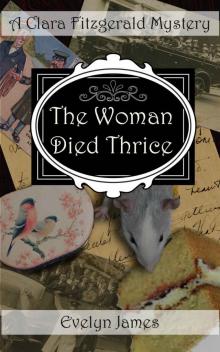 The Woman Died Thrice
The Woman Died Thrice The Poison Pen
The Poison Pen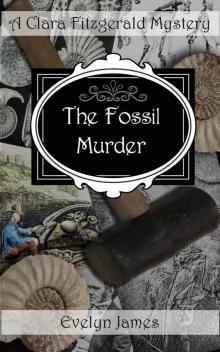 The Fossil Murder
The Fossil Murder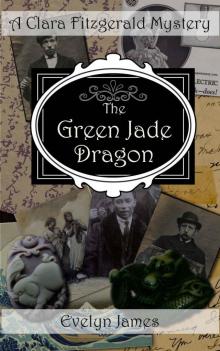 The Green Jade Dragon
The Green Jade Dragon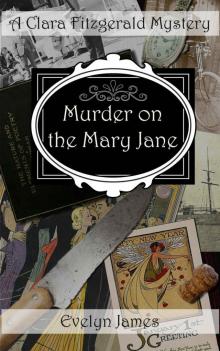 Murder on the Mary Jane
Murder on the Mary Jane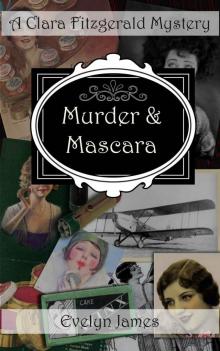 Murder and Mascara
Murder and Mascara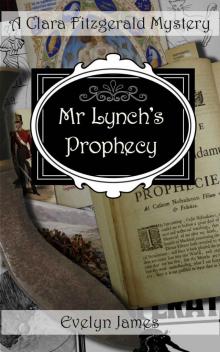 Mr Lynch's Prophecy
Mr Lynch's Prophecy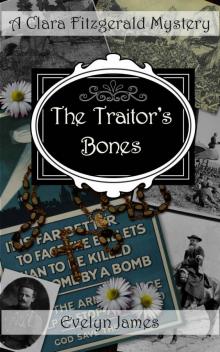 The Traitor's Bones
The Traitor's Bones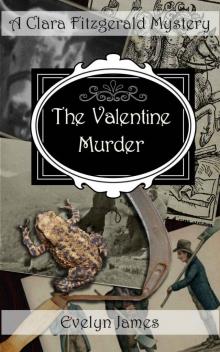 The Valentine Murder
The Valentine Murder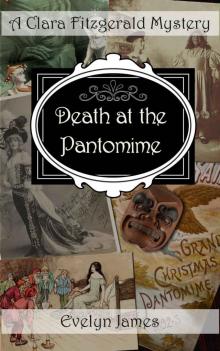 Death at the Pantomime
Death at the Pantomime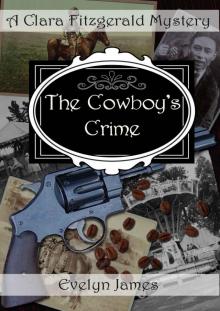 The Cowboy's Crime
The Cowboy's Crime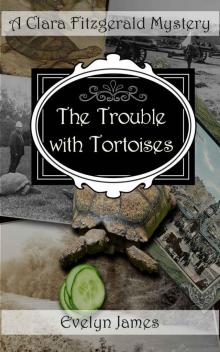 The Trouble With Tortoises
The Trouble With Tortoises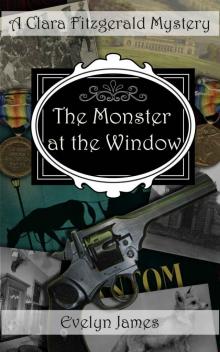 The Monster at the Window
The Monster at the Window